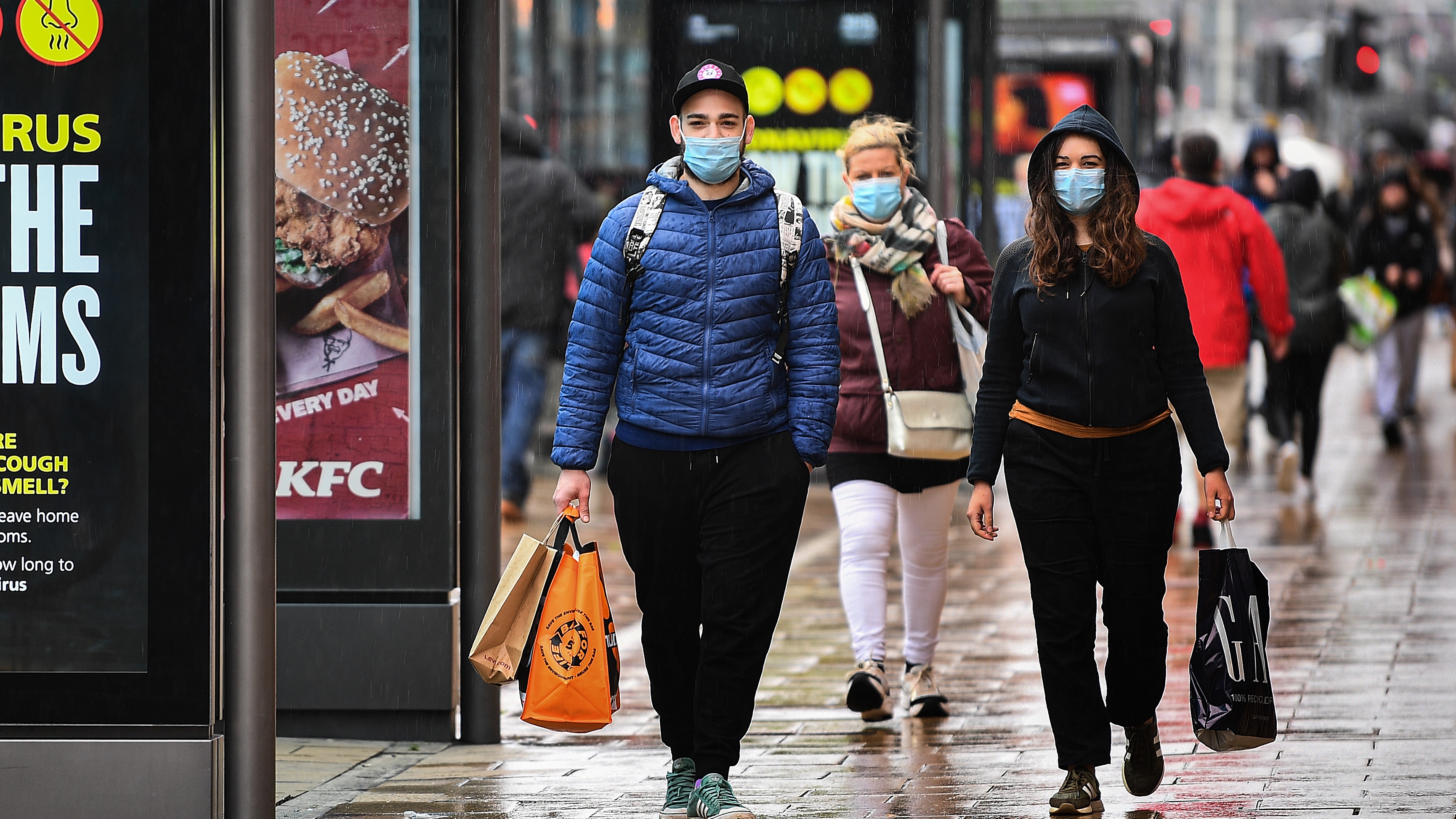Why Scotland’s Covid cases drop is good news for England
But new Delta Plus variant is causing concern north of the border too

A free daily email with the biggest news stories of the day – and the best features from TheWeek.com
You are now subscribed
Your newsletter sign-up was successful
Downing Street health experts are hoping that declining Covid-19 infection rates in Scotland signal an impending end to the fresh wave of infections hitting England.
Latest data from the Office for National Statistics shows that infection levels in Scotland have fallen from 2.3% of the total population in mid-September to about 1.3% last week. By contrast, infection rates in England rose from about 1.1% to 1.6%.
England driving UK spike
The Week
Escape your echo chamber. Get the facts behind the news, plus analysis from multiple perspectives.

Sign up for The Week's Free Newsletters
From our morning news briefing to a weekly Good News Newsletter, get the best of The Week delivered directly to your inbox.
From our morning news briefing to a weekly Good News Newsletter, get the best of The Week delivered directly to your inbox.
Overall, Covid cases in the UK are increasing, with 49,156 reported new infections on Monday – the highest total since mid-July.
But the majority of infections are in England, where health leaders are calling on the government to implement its “Plan B” for coronavirus restrictions to “avoid undermining” efforts to tackle the NHS backlog, said the Financial Times (FT).
At a press conference yesterday, Health Secretary Sajid Javid said the government would not be implementing its plan B strategy for England, which would include wearing mandatory face coverings and advice to work from home, “at this point”.
Although the NHS was already facing “huge pressures”, they were not yet “unsustainable”, he said. But warning that cases could rise to up to 100,000 a day, he added: “If we feel at any point it’s becoming unsustainable… we won’t hesitate to act.”
A free daily email with the biggest news stories of the day – and the best features from TheWeek.com
If “not enough people get their booster jabs” or “wear masks when they really should”, and “if they’re not washing their hands and stuff, it’s going to hit us all”, said Javid. “And it would of course make it more likely we’re going to have more restrictions.”
Scottish success
According to Professor Mark Woolhouse of the University of Edinburgh, the differences in infection levels on both sides of the border – as well as between the UK and the rest of Europe – can largely be explained by two factors.
The infectious diseases expert told The Times that the first is what the paper described as “changing behaviours”, with people in general becoming “more relaxed” about the virus and taking measures to prevent infection. The other is immunity, built up through both natural exposure to the virus and vaccination.
“Both of these forces are pushing the epidemic really hard but in opposite directions,” said Woolhouse. “Even small differences from place to place can lead to quite big differences in trajectory.”
A key behavioural difference between England and Scotland is levels of mask-wearing, said the BBC. Global surveys by YouGov and Imperial College London have found that overall, UK residents are “significantly more likely” to say they are no longer wearing a mask in public than people in Germany, France, Spain and Italy.
Within the UK, the recommendation to wear face masks indoors has been removed in England, while Scottish guidelines still recommend covering up inside.
However, while “study after study has shown face masks can help stop the virus from being passed between people”, said the broadcaster, measuring how much mask wearing reduces an outbreak is “a lot more difficult to pin down”. And despite lower infection rates overall, Scotland has seen a “spike in hospital admissions in recent weeks”.
A separate “plausible explanation” for Scotland’s falling case rates, said The Times, is immunity levels, which have been high enough there in recent weeks for the pandemic to “shrink”.
As the paper pointed out, schools in Scotland returned from the summer holidays three weeks earlier than in England, which may have allowed the “highly transmissible” Delta variant to “rip through schools”. Unvaccinated school children were able to “catch up” with vaccinated adults through natural infection, experts have suggested.
“That wave appears to have passed in Scotland,” said Woolhouse. “Whereas England doesn’t seem to have reached the downside of it yet... I would expect to see it turnaround in England quite soon.”
But not all epidemiologists are “entirely convinced”, said the paper.
Professor Graham Medley, who chairs the government’s Spi-M panel of modellers but “who was speaking in a personal capacity”, told the paper there were no “clear signal of differences in immunity” between the two nations. Differing infection rates could also be explained by “differences in contact patterns”, he said.
Variant of concern
Coronavirus infection rates remain low in Scotland, with 2,768 new cases reported by Nicola Sturgeon’s government on Wednesday. But a new “descendent” of the Delta variation of Covid “is causing a spike in infections” here, said Glasgow-based paper The Herald.
Latest official data suggests that overall in the UK, the new AY.4.2 variant, also known as Delta-plus, accounts for around 6% of new Covid cases.
First Minister Sturgeon tweeted on Tuesday that her cabinet had discussed “the need to monitor” the new mutation.
“More generally, cases here – though lower than few weeks ago – remain higher than we’d like,” she added. “So please take care: wear masks, wash hands, ventilate indoor spaces, and get vaccinated.”
-
 El Paso airspace closure tied to FAA-Pentagon standoff
El Paso airspace closure tied to FAA-Pentagon standoffSpeed Read The closure in the Texas border city stemmed from disagreements between the Federal Aviation Administration and Pentagon officials over drone-related tests
-
 Political cartoons for February 12
Political cartoons for February 12Cartoons Thursday's political cartoons include a Pam Bondi performance, Ghislaine Maxwell on tour, and ICE detention facilities
-
 Arcadia: Tom Stoppard’s ‘masterpiece’ makes a ‘triumphant’ return
Arcadia: Tom Stoppard’s ‘masterpiece’ makes a ‘triumphant’ returnThe Week Recommends Carrie Cracknell’s revival at the Old Vic ‘grips like a thriller’
-
 A Nipah virus outbreak in India has brought back Covid-era surveillance
A Nipah virus outbreak in India has brought back Covid-era surveillanceUnder the radar The disease can spread through animals and humans
-
 Covid-19 mRNA vaccines could help fight cancer
Covid-19 mRNA vaccines could help fight cancerUnder the radar They boost the immune system
-
 The new Stratus Covid strain – and why it’s on the rise
The new Stratus Covid strain – and why it’s on the riseThe Explainer ‘No evidence’ new variant is more dangerous or that vaccines won’t work against it, say UK health experts
-
 RFK Jr. vaccine panel advises restricting MMRV shot
RFK Jr. vaccine panel advises restricting MMRV shotSpeed Read The committee voted to restrict access to a childhood vaccine against chickenpox
-
 The UK’s opioid crisis: why the stats don’t add up
The UK’s opioid crisis: why the stats don’t add upThe Explainer A new report has revealed that the UK’s total of opioid-related deaths could be much greater than official figures show
-
 RFK Jr. scraps Covid shots for pregnant women, kids
RFK Jr. scraps Covid shots for pregnant women, kidsSpeed Read The Health Secretary announced a policy change without informing CDC officials
-
 New FDA chiefs limit Covid-19 shots to elderly, sick
New FDA chiefs limit Covid-19 shots to elderly, sickspeed read The FDA set stricter approval standards for booster shots
-
 RFK Jr.: A new plan for sabotaging vaccines
RFK Jr.: A new plan for sabotaging vaccinesFeature The Health Secretary announced changes to vaccine testing and asks Americans to 'do your own research'